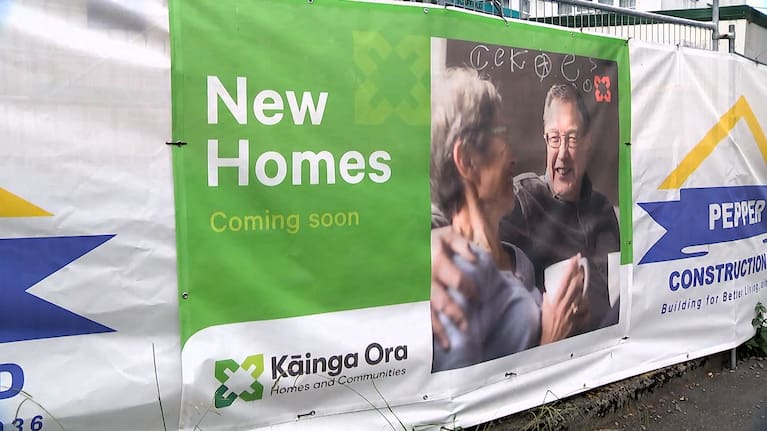Kāinga Ora has been "underperforming" and is not financially viable without significant changes, a Government-commissioned review of its affairs has found.
It also suggested the wider social housing system is under-delivering, lacks transparency and accountability, and has a "poor understanding" of tenant outcomes.
The review was led by former prime minister Bill English and was kicked off by the coalition Government within its first full month in power, as part of its 100-day plan.
The review was led by former prime minister Bill English and was kicked off by the Government as part of its 100-day plan. (Source: 1News)
In response to the report's release, the Government announced changes at its post-Cabinet media conference this afternoon, including appointing a new chairperson to Kāinga Ora.
Housing Minister Chris Bishop said Kāinga Ora's performance had a "material impact" on the Crown's fiscal position as a large Crown entity with assets of $45 billion and over $2.5 billion of expenditure every year while remaining the country's biggest landlord.
The agency also had a "huge impact on the people it was there to serve", he said.
"Over the past six years, even while billions of dollars were poured into it by the previous government, Kāinga Ora left thousands of social houses sitting vacant, tenants were left to rack up enormous rent arrears, and threatening, abusive tenants were permitted to continue living in Kāinga Ora homes despite the terror they inflicted on their neighbours.
"Despite all this, the waiting list for a social house quadrupled."

Bishop said the Government had "significant concerns about the financial performance and governance of Kāinga Ora" when it first came into office, and that those concerns had been "borne out" by the independent review.
There were two broad findings, he said.
“First, Kāinga Ora is underperforming and not financially viable without significant savings as well as funding and financing changes.
"Second, the wider social housing system is not delivering the results New Zealand needs, and is lacking in transparency and accountability, coupled with a poor understanding of tenant outcomes."
He said the review also made it clear Kāinga Ora's financial situation was "very worrying".
"The operating deficit at the time the review was undertaken was forecast to grow from $520 million in 2022/23 to over $700 million in 2026/27, driven by interest on the debt-financed capital investment programme.
"Debt is forecast to increase to $23 billion. Kāinga Ora’s forecast cash requirement from the Crown is $21.4 billion over the next four years.
"This is equivalent to every New Zealander paying about $4000 for this activity."

The minister said the review also found "Kāinga Ora had had easy access to debt but insufficient focus on fiscal discipline, and low levels of accountability had led to growing annual losses and a deteriorating financial situation."
“We are also concerned about the findings in the review about the governance of Kāinga Ora.
"The review noted evidence that there has not been a clear separation between the board’s governance role and operational management and that they saw evidence that the board has been acting more as an advisory function rather than governing."
Bishop said the Government was "alarmed to learn" for example, that in Kāinga Ora's May 2023 board budget pack, there was no Statement of Financial Position.
Cabinet today agreed to four of the review's seven main recommendations. They were:
- Aligning contractual arrangements across Kāinga Ora and Community Housing Providers
- Refreshing the Kāinga Ora board
- Issue simplified direction to Kāinga Ora
- Ministers setting an expectation that the Kāinga Ora board will develop a credible and detailed plan to improve financial performance to eliminate losses.
Bishop said Cabinet appointed former Spark chief executive Simon Moutter as the new chairman of Kāinga Ora. He would replace acting chairperson John Duncan, a former deputy chairman of the Public Trust and former Housing New Zealand board member.
Bishop said Moutter had "extensive change leadership experience" as the chief executive of Powerco, Auckland International Airport, and at Spark, where he won the Deloitte Top200 NZ CEO of the Year in 2017. He would start in the role on June 4.
“Further consideration of the board composition is ongoing with a refreshed board expected to be in place in July.
"Ministers will then issue a new letter of expectations which makes crystal clear our expectations regarding Kāinga Ora’s focus on fiscal sustainability, value for money, and a ‘back to basics’ approach for their essential functions.
“The first task of the refreshed board will be to present a Kāinga Ora turnaround plan to ministers by the end of the year, which focuses on returning Kāinga Ora to financial sustainability and eliminating losses."
Bishop said other changes proposed by the review would be considered "in the coming months. These changes include "moving to a model where the Government becomes an active purchaser that takes a social investment approach to cost-effectively improving housing outcomes."
"At first blush, the recommendations align with our broader social policy objectives, so we will be looking at them closely, as well as considering broader housing funding settings.”
The Government announced the review into Kāinga Ora in December last year. The action was one of those signalled in the coalition Government's 100 day plan, as the first step in "the Kāinga Ora clean-up".
In response to the changes, Labour housing spokesperson Kieran McAnulty said it was a "pretty disappointing press conference" with "a lot of excuses and a lot of distractions".
"It's like they've only just realised it costs money to build houses."
He said Labour had built Kāinga Ora up from the ground and delivered about 14,000 public homes through the agency and community housing providers.
Green Party housing spokesperson Tamatha Paul said it was history repeating.
"A National-led Government is once again trying to create social licence for the sale of our public housing stock, at a time when new housing is absolutely essential.
Speaking to media, Bishop said he ruled out "a mass sell-off of state houses".




















SHARE ME